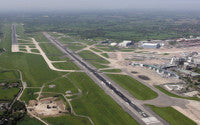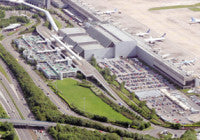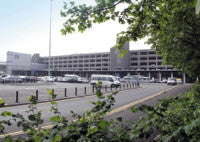Bunting has take off!
 Earlier in 2007, Manchester City Council was placed under severe pressure to sell their prime asset, Manchester Airport, to create a fund to invest in the city's future prosperity. No doubt, if the airport were ever to be sold, there would be a feeding frenzy of interested buyers.
Earlier in 2007, Manchester City Council was placed under severe pressure to sell their prime asset, Manchester Airport, to create a fund to invest in the city's future prosperity. No doubt, if the airport were ever to be sold, there would be a feeding frenzy of interested buyers.
But, for now, the Council are adamant that the airport will not be sold. With its stock very much in the ascendancy, few could argue against that view. Britain's second largest airport operator was voted the country's best airport in 2006 and is taking its environmental responsibilities seriously.
The airport has recently committed to becoming carbon neutral by 2015 for its energy and vehicle use. It was also awarded the city's first-ever Gold Environmental Business Pledge Award for its broad-reaching commitment to environmental best practice.
And, with landscape and habitat management playing a central part in the environment plan, it is a busy time for all grounds professionals.
In his 26 years as landscape manager at Britain's only local authority owned airport, 53-year-old Hugh Bunting has seen constant change. "Manchester airport's landscape is developing all the time," he said. "The technology is changing, the emphasis on the environment is so much different to when I started off and there are many more considerations we have to factor into our job now."
Perhaps the most notable of these is that of security. "We have to plant shrubs to ensure they reach a lot lower height at maturity for security reasons," he says, surveying the 335 acres he has to maintain. "This is so that people can't easily hide anything in the grounds."
With airports no longer able to conceal facts about their CO2 emissions either, there is plenty of work to be done to make sure the airport remains one of the greenest in Europe.
As part of their green plan, a £17m environmental mitigation package has been launched, calling for six trees to be planted for every one removed, providing or improving two ponds for each lost, planting or restoring over 36km of hedgerow and creating new areas of wildflower grassland and woodland.
Other targets include the establishment of two new bat breeding roosts, maintaining thriving badger clans and ensuring that the 46 new ponds are similarly maintained as a suitable habitat for amphibians.
Achieving the creation of wildflower grassland has been an arduous process. On sites where the topsoil was completely removed, the exposed dense clay subsoils were inhospitable for germination and establishment of seedlings. Only through a combination of low and fast release fertiliser, and composted green waste to reduce bulk density and increase porosity, were the seeds able to germinate.
Keeping some of the thriving biodiversity away from the airfields is another responsibility, however. "We have to keep birds away from the runway as much as possible," Hugh explains, mindful of the fact that a plane was forced to make an emergency landing in Manchester earlier this year when two birds were sucked into the starboard engine.
"Thankfully bird strike incidents are extremely low," he says, adding that a bird control team is employed at the airport to patrol taxi areas and runways and disperse persistent birds through the use of bio-acoustic equipment.
The airport also employs a falconer to scare away flocks.
"This also becomes our responsibility," he explains. "In conjunction with our environment team, we've had to reduce the amount of berry-bearing trees and make sure that tall trees are constantly thinned so that they have a thin crown, which makes them unattractive to birds."
Changing weather conditions have also impacted on the job, as milder winters mean the grass needs to be more frequently cut. "We seldom stop mowing nowadays. We're still mowing well into autumn now and it used to be the case that we stopped from October to March. Now we carry on cutting."
This creates a considerable amount of waste and Hugh explains that this is all recycled. "We have a large waste contract with Greater Manchester Waste Disposal Authority and this places a great emphasis on recycling," he says. "We recycle grass, plastic and cardboard. The grass used to be put into bales and sent to local farmers but now we recycle it."
Working with a small team of five, Hugh is responsible for providing what he calls a "pleasant environment for staff, passengers and the public", as well as the upkeep of floral displays in the terminals, roads, signs, woodland management and conservation areas.
Technology has transformed the job over the years. "We used to use pedestrian mowers to cut the entire grass area. If I asked my team to do that now they'd look at me like I was joking," he laughs. "The varied workload is probably a lot like looking after a stately home," he adds, "and the situation today is a far cry from when I started here in 1978. Then I looked after ornamental lawns and shrubs in one terminal, and the landscaped perimeters of just two car parks."
Now he has three terminals to contend with, driven by vastly increased air traffic at the airport since the second runway was built.
Nowadays, the airport embraces all the new technology. "We use everything from mulching mowers to tree and woodland management software," he says. "Along with the usual staple of compact tractors, triple ride-on mowers, chainsaws and strimmers.
" Add to this the support of an in-house environment team and ecologist and the size of the job in managing the landscape becomes apparent. "It's such a wide-ranging industry nowadays," he explains. "A lot of people don't know the scope of the job. It ranges from the basic gardener to research scientists looking at new strains in laboratories. It's a huge industry."
But it's also one that he believes suffers from a low level of awareness among younger people. "We've an ageing skills base and I don't see many young people coming into the industry," he says. "There needs to be some considerable work done in schools and careers fairs to change this perception that we are just a low paid industry.
"We do a fair amount of work experience here but the children tend to want to work in more glamorous jobs in the airport and don't really understand the scope of our work in grounds maintenance."
To further drive his point home, he recalls recently looking through a careers brochure that his children were given at school. "It was very patronising," he says. "Under horticulture it simply said you need a desire to get your hands dirty. That is quite insulting really, as no two days here are the same.
One day you'll be working with the ecologist on a conservation site and the next you could be laying turf to help put Concorde on display. We really need to change this one dimensional perception of the kind of work we do."
His job today is based as much on people management, for instance managing change and keeping abreast of health and safety legislation, as it is on turf and plant care - which is a science in itself.
One area where the airport's landscape team stand to make progress on raising awareness of the job they do is through their network of community champions. This sees Hugh and his team engage with local communities to promote civic improvement and show how the airport is committed to being a good steward of its surrounding environment.
"We're involved in a lot of community projects," Hugh explains. "We've recently worked with the YMCA and we're currently working with the Shaw Trust, an organisation that provides training and work opportunities for people who are disadvantaged or have a disability. We've taken a placement from the Shaw Trust and he is currently studying for an NVQ level 2 award in Amenity Horticulture."
Hugh is the first to admit that there is still considerable work to be done to raise public awareness of the valuable work carried out by grounds professionals.
But after the events at Glasgow airport earlier this year, which saw Stephen Clarkson, a self-employed groundsman, single-handedly tackle a terrorist and subsequently receive national praise for his actions, is there a better advert for the profession?
"Grounds maintenance is changing," concludes Hugh, "and I'm pleased that its 'cloth cap' image is starting to change. But there's still a lot more work to do!"
